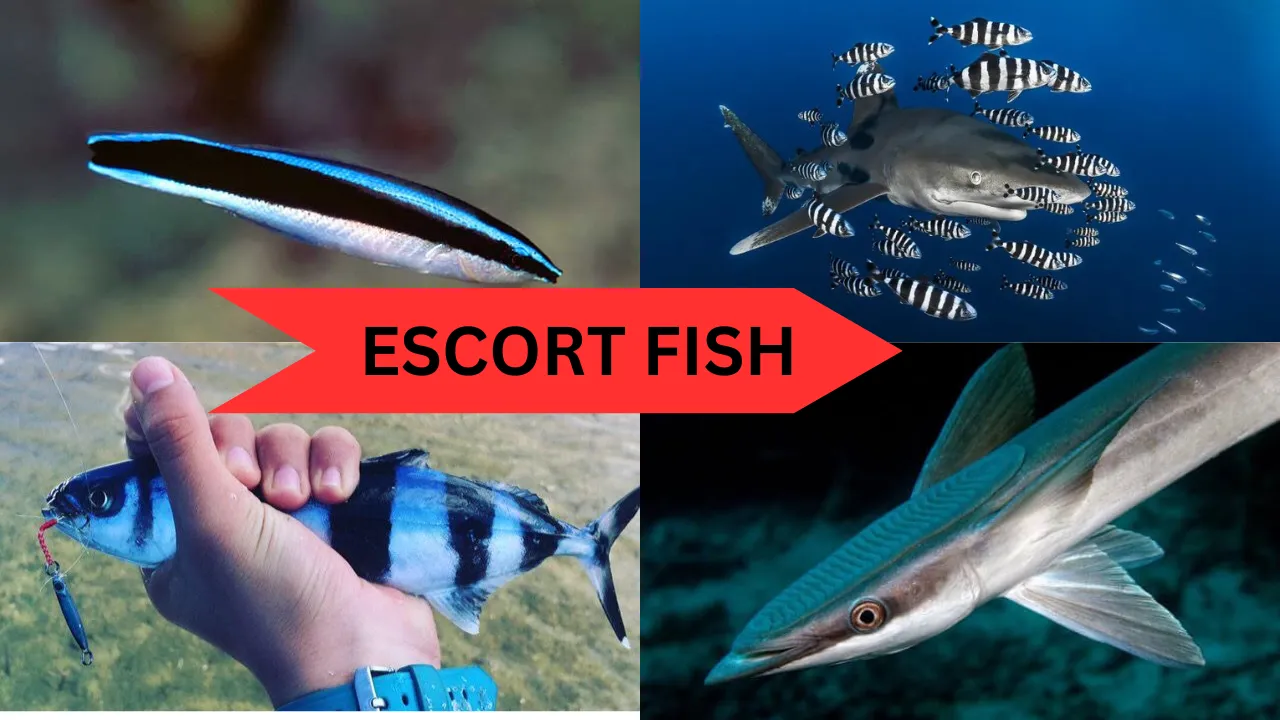In the ocean and its various species of fish, some species of fish have assumed an extra-ordinary role, as will be seen. These are commonly referred to as escort fish; they are involved in rather unusual mutualistic interactions with such large sea partners as sharks, rays, and turtles. The relations are not only synergistic but also complementary; they offer security, maintenance, and advice, which are indispensable to sealing their hosts’ fate and the fates of the ecosystems they belong to.
Understanding Escort Fish
Escort fish are characterized by their association with larger marine animals, where they act as companions and protectors. This behavior is not purely opportunistic but has evolved over time into a mutually beneficial relationship. These fish are often smaller in size and highly agile, traits that enable them to maneuver efficiently around their larger hosts. By attaching themselves or swimming in close proximity to these hosts, escort fish gain access to food sources, protection from predators, and other benefits while fulfilling specific ecological roles.
Examples of Escort Fish
1. Remoras (Family: Echeneidae)
Remoras are among the most well-known escort fish species. They possess a distinctive dorsal fin modified into a suction cup-like structure that allows them to attach securely to larger marine animals, including sharks, whales, and sea turtles. This attachment is not parasitic but rather mutually advantageous. Remoras benefit from the safety and food sources provided by their hosts, while in return, they clean the host’s skin of parasites and other organisms and may even signal danger by altering their behavior.

2. Pilot Fish (Family: Naucratidae)
Another famous category of escort fish species spotted in the sea is the pilot fish. They are generally seen feeding with sharks, rays, and other big species of fish. Overall, pilot fish are skinny with a silvery color, and they are good swimmers, just like the sharks they are associated with. These animals play the same role as remoras: they eat parasites and dead cells that accumulate on their host’s skin. Other functions of pilot fish are physical cleaning services and sensory report services. It is thought that the pilot fish helps the larger fish to orient or to give signals of a possible threat or presence of food.

3. Cleaner Wrasse (Family: Labridae)
Although cleaner whales do not strictly speak of escort fish in the true sense, they are perhaps the most important group in the context of the medical care of marine animals. Cleaner wrasse can mostly be observed in corals, and these fish have specific sites where they help other big fish and even sea turtles get rid of parasites and dead skin. This behavior is essential for the health of the cleaner wrasse and their clients, since the former feeds off the latter within the course of cleaning their body and feeding off parasites. It also proved to be a win-win situation for both parties, just another example of mutualism in the marine environment.

Ecological Benefits of Escort Fish
The presence of escort fish offers several ecological advantages within marine environments:
- Parasite Control: Escort fish, such as remoras and cleaner wrasse, contribute to the overall health of their hosts by removing parasites and dead tissue. This cleaning behavior reduces the risk of infections and improves the longevity of the larger animals.
- Predator Deterrence: By swimming in close proximity to larger hosts, escort fish may deter potential predators through their presence or by signaling danger. This protective role enhances the survival chances of the host animal, particularly vulnerable species like sea turtles and smaller sharks.
- Navigation and Communication: Some escort fish, like remoras, are believed to assist their hosts in navigation by signaling changes in behavior or movement patterns. This cooperative behavior can aid in finding food sources or avoiding threats in the expansive and often challenging marine environment.
Research and Conservation Implications
Ongoing scientific exploration of the escort fish species continues to discover information about its function in the ecosystem, evolution, and much more. Knowledge of these interactions is important for the conservation of marine species and the overall health of marine ecosystems. Ecologists agree with the protection of the smaller prey, or escort fish species, as well as the larger host fish, as a blow to one affects the other, causing a domino effect on other species in the ecosystem.
Conclusion
Escort fish show how a delicate balance of interdependence is observed in the structure of marine life. These small but rather important fish species help maintain underwater ecosystems and literally feed on larger sea creatures. From cleaning and preventing predators to guiding and even helping in the movement of other species, they are complex organisms that make people aware of the importance of life beneath the seas. As the reader gains a better understanding of escort fish, he/she becomes more embraced by the natural world and the need to conserve the marine environment.
With the understanding and preservation of such species, we improve our body of knowledge in the field of marine biology and play our part in increasing the area of the ocean and sea and their resources for future generations. With escort fish’s evidence of the roles played by all life forms in the marine world, conservation and sustainable practices become paramount in protecting the oceans to retain the pristine integrity of their ecosystems.
Similar Article : Top 10 Dangerous Fish with Big Teeth

